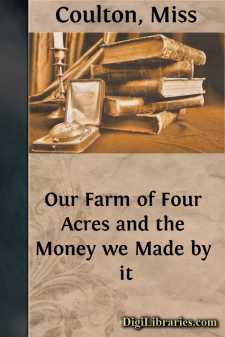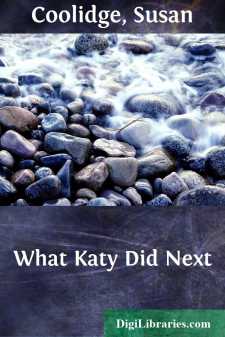Fiction
- Action & Adventure 180
- Biographical 15
- Christian 59
- Classics 6965
- Coming of Age 5
- Contemporary Women 3
- Erotica 8
- Espionage/Intrigue 12
- Fairy Tales, Folklore & Mythology 236
- Family Life 169
- Fantasy 117
- Gay 1
- General 596
- Ghost 32
- Historical 808
- Horror 43
- Humorous 160
- Jewish 25
- Legal 4
- Medical 22
- Mystery & Detective 315
- Political 49
- Psychological 41
- Religious 64
- Romance 159
- Sagas 11
- Science Fiction 730
- Sea Stories 113
- Short Stories (single author) 537
- Sports 10
- Suspense 1
- Technological 8
- Thrillers 2
- Urban Life 31
- Visionary & Metaphysical 1
- War & Military 173
- Westerns 199
Fiction Books
Sort by:
by:
Miss Coulton
CHAPTER I. WHERE SHALL WE LIVE? "Where shall we live?" That was a question asked by the sister of the writer, when it became necessary to leave London, and break up a once happy home, rendered desolate sudden bereavement. "Ah! Where, indeed?" was the answer. "Where can we hope to find a house which will be suitable for ourselves, six children, and a small income?" "Oh,"...
more...
by:
Dion Boucicault
CHAPTER I. THERE are places which appear, at first sight, inaccessible to romance; and such a place was Mr. Wardlaw's dining-room in Russell Square. It was very large, had sickly green walls, picked out with aldermen, full length; heavy maroon curtains; mahogany chairs; a turkey carpet an inch thick: and was lighted with wax candles only. In the center, bristling and gleaming with silver and...
more...
by:
Susan Coolidge
CHAPTER I. AN UNEXPECTED GUEST. The September sun was glinting cheerfully into a pretty bedroom furnished with blue. It danced on the glossy hair and bright eyes of two girls, who sat together hemming ruffles for a white muslin dress. The half-finished skirt of the dress lay on the bed; and as each crisp ruffle was completed, the girls added it to the snowy heap, which looked like a drift of...
more...
BOSTON, May 8, 1678. I remember I did promise my kind Cousin Oliver (whom I pray God to have always in his keeping), when I parted with him nigh unto three months ago, at mine Uncle Grindall's, that, on coming to this new country, I would, for his sake and perusal, keep a little journal of whatsoever did happen both unto myself and unto those with whom I might sojourn; as also, some account of the...
more...
ODE TO GOD. From the Hebrew. Reign’d the Universe’s Master ere were earthly things begun;When His mandate all created, Ruler was the name He won,And alone He’ll rule tremendous when all things are past and gone;He no equal has nor consort, He the singular and loneHas no end and no beginning, His the sceptre, might, and throne;He’s my God and living Saviour, rock to which in need I run;He’s my...
more...
CHAPTER 1. THE COUNCIL OF WAYS AND MEANS This is the story of the different ways we looked for treasure, and I think when you have read it you will see that we were not lazy about the looking. There are some things I must tell before I begin to tell about the treasure-seeking, because I have read books myself, and I know how beastly it is when a story begins, "'Alas!" said Hildegarde with...
more...
by:
John Rae
OUR AGREEABLE FELLOW PASSENGER n the same spirit in which a solicitous mamma or benevolent middle-aged friend will sometimes draw forth from the misty past some youthful misdeed, and set the faded picture up before a girl's eyes, framed in fiery retribution—for an object lesson and a terrible example—so will I, benevolent, if not middle-aged, put before the eyes of my sisters a certain...
more...
PREFACE In the execution of the present task (which I took over about two years ago from hands worthier than mine, but then more occupied) some difficulties of necessity occurred which did not present themselves to myself when I undertook the volume of Elizabethan Literature, or to my immediate predecessor in grappling with the period between 1660 and 1780. The most obvious and serious of these was the...
more...
by:
Aunt Fanny
My Darling Children: I wrote these stories, as I have already told you, some years ago, and took a great deal of pains with them. I called them "Life Among the Children;" when, lo and behold! somebody else had written a book with the very same name, but very different stories, and I never knew one word about it. You may believe how sorry I was to take this pretty title when it belonged to...
more...
CHAPTER I. THE SCHOOL-HOUSE. Early this morning I opened a window in my school-house in the glen of Quharity, awakened by the shivering of a starving sparrow against the frosted glass. As the snowy sash creaked in my hand, he made off to the waterspout that suspends its "tangles" of ice over a gaping tank, and, rebounding from that, with a quiver of his little black breast, bobbed through the...
more...











